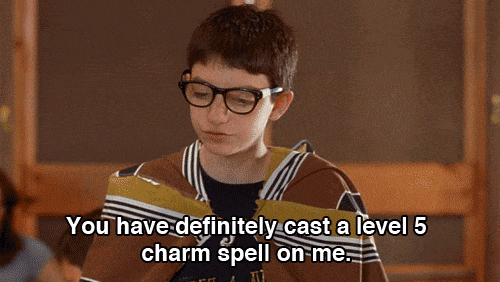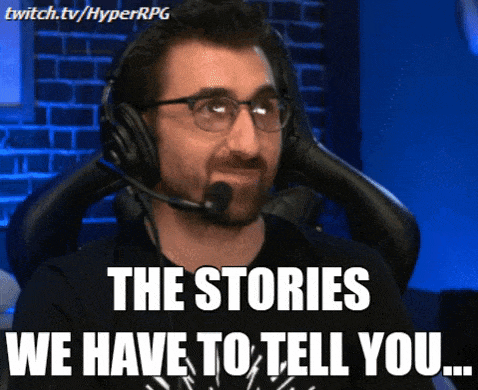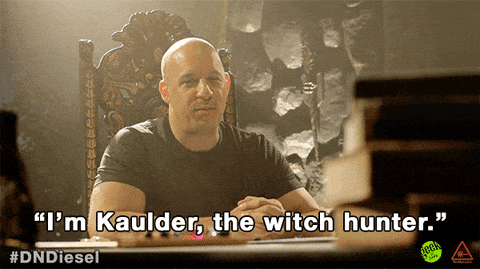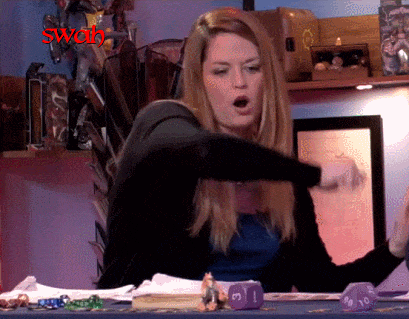Ah. You read the headline. Some of you are screaming, “NOPENOPENOPENOPENOPE! Don’t you dare put a label on me!” Others are shrugging and saying, “Eh, whatever, let’s get weird.” Maybe you are thinking curse words, believing the Enneagram is nothing but gobbledygook. Maybe you are wildly enthusiastic, thinking it speaks to your soul.
Such is the nature of the Enneagram.
The Enneagram is a personality assessment that describes people in terms of nine types, each with their own motivations, fears, and internal dynamics. I really want to create controversy, so I’ll overlay the 9 types with D&D’s alignment system.
The Enneagram is an emotionally focused system of understanding people — honing in on one’s core emotional motivations and fears. Each of the nine personality types has its own driving force, which is centered around a particular emotion. Some Enneagram types experience strong emotions, while other types aim to avoid emotions in one form or another. However, whether running from emotions or diving into them, each type describes some aspect of emotional experience.
If you haven’t discovered your Enneagram type, you really should. It will help you understand yourself better, as well as how you relate to and care for those around you. Here is a quick and free assessment to whet your appetite. Now, let’s have some fun. Below are 9 enneagram types and how they relate to the people you play D&D with.
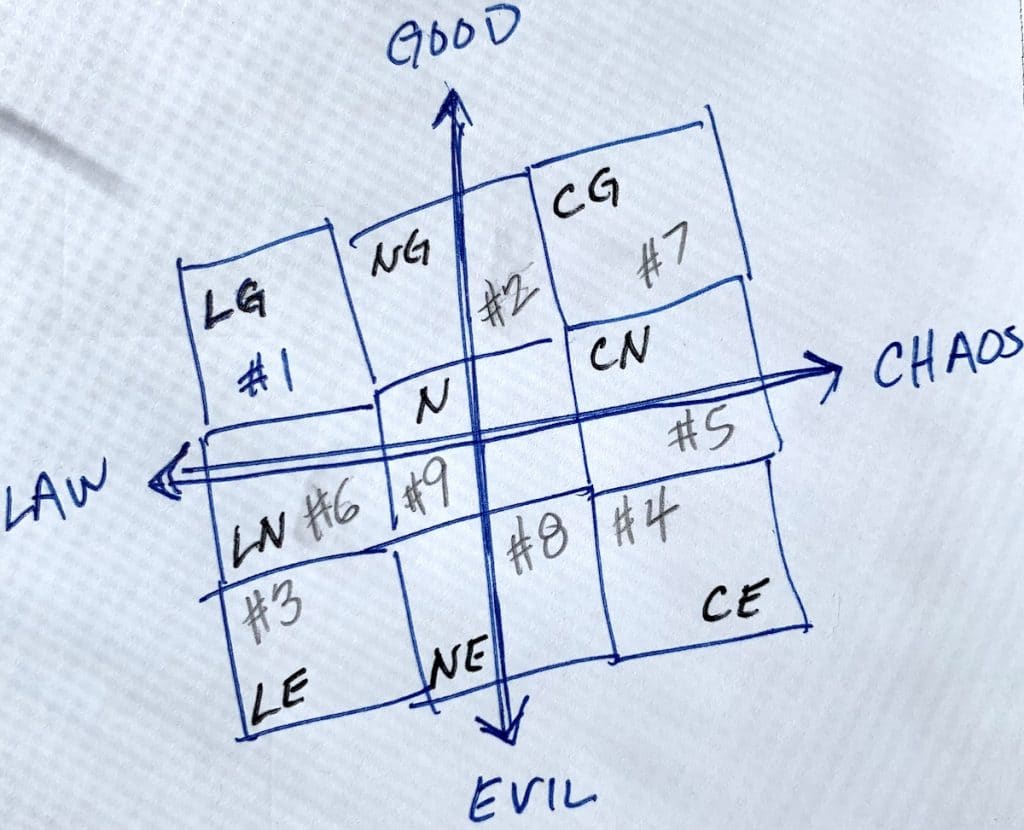
1. THE REFORMER
Enneagram Type One is the Reformer. Ones are conscientious and ethical, with a strong sense of right and wrong. They are teachers, crusaders, and advocates for change: always striving to improve things, but afraid of making a mistake. Well-organized, orderly, and fastidious, they try to maintain high standards, but can slip into being critical and perfectionistic.
At their best they are wise, discerning, realistic, and noble. When they are confident, they exhibit Enneagram Type Seven behavior and are fun-loving and adventurous. But in times of stress their Achilles’ heel can be their self-righteous anger. They may get angry easily and are offended by what seems to be the perverse refusal of others to do the right thing—as they have defined it.
In game terms, an Enneagram One is the “Rules Lawyer” at the table. They have read every single rule and they’ve determine the right thing to do is to have everyone follow the rules, because that’s what’s fair in their eyes. Celebrate these folks at your table for their conscientiousness and their desire to have things be “right.” Try to be patient when they are stressed, as they can become a bit persnickety.
Type Ones are Lawful Good on the alignment chart and often play Paladins. Full Type One overview here.
2. THE HELPER
Type Twos are the Helper. Twos are empathetic, sincere, and warm-hearted. They are friendly, generous, and self-sacrificing, but can also be sentimental, flattering, and people-pleasing. They are well-meaning and driven to be close to others, but can slip into doing things for others in order to be needed. Twos want to be liked and find ways that they can be helpful to others so that they belong. This type fears being unlovable.
They typically have problems with possessiveness and with acknowledging their own needs. But at their best they are unselfish and altruistic, having unconditional love for others. This personality type is named the Helper because people of this type are either the most genuinely helpful to other people or, when they are less healthy they are the most highly invested in seeing themselves as helpful.
These are the D&D players who bring snacks to every session. They are also on the lookout for someone that may be feeling bad that day and are eager to help and be seen as helpful. Take care to acknowledge what they bring, as they want to be seen as helpful and their feelings are often hurt if not seen.
Type Twos are Neutral Good on the alignment chart and often play Clerics. Full Type Two overview here.
Side Bar: Enneagrams 2s, 3s, and 4s are sometimes referred to as "heart types" because they react with emotions first. They connect with other people on an empathetic level, and make sense of the world by understanding their feelings about it. These types are guided by the feelings connected to their emotional relationships with other people. They value things such as emotional support, recognition, and inclusion and are the folks at the table who will likely want to check in with everyone's personal life before the session starts.
3. THE ACHIEVER
Enneagram Type Three is the Achiever. Threes are self-assured and charming. Ambitious, competent, and energetic, they can also be status-conscious and highly driven for advancement. They are diplomatic and poised, but can also be overly concerned with their image and what others think of them.
Threes are success-oriented and typically have problems with workaholism and competitiveness. Threes want to be successful and admired by other people, and are very conscious of their public image. Type Threes fear failure and not being seen as valuable by other people. But Threes at their best are authentically everything they seem to be—role models who inspire others.
Threes are the players who play a min/maxxed character, as they want to be seen as the best at the table. They will optimize and work hard to make sure what they bring to the table is the “best.” Threes are great in that they are often natural leaders who challenge folks to up their game, making the entire experience better. But they also have a need to be seen as the best, so make sure you brag on their character every now and again.
Type Threes are Lawful Evil on the alignment chart and often play a min/maxed character. Full Type Three overview here.
4. THE INDIVIDUALIST
Fours are self-aware and sensitive, and called the Individualist as a result. They are emotionally honest, creative, and personal, but can also be moody and self-conscious. They may withhold themselves from others due to feeling vulnerable and defective, because Fours feel that they are unlike other human beings, and consequently, that no one can understand them or love them adequately.
They often see themselves as uniquely talented, possessing special, one-of-a-kind gifts, but also as uniquely disadvantaged or flawed. More than any other type, Fours are acutely aware of and focused on their personal differences and deficiencies.They typically have problems with melancholy, self-indulgence, and self-pity. Fours at their best are highly creative and often dial up that part of themselves in order to illustrate their individuality.
Fours desire to been seen as unique and to experience deep, authentic emotions, but can sometimes be sensitive, withdrawn, and temperamental as a result. Sadly, fours fear they are flawed and are overly focused on how they are different from other people.
As a result, Fours are often the “creatives” you see at the table who are deep into expressing themselves via cosplay and want wholeheartedly to dive into emotional roleplay. They make up an outsized portion of the D&D streaming community and are likely the player that arrives in costume.
Type Fours are Chaotic Evil on the alignment chart and play a character with the most flowery backstory. Full Type Four overview here.
5. THE INVESTIGATOR
A key motivator for Enneagram Type Five is to possess knowledge, to understand the environment, and to have everything figured out, so they are called the Investigator. Fives are alert, insightful, and curious. They are able to concentrate and focus on developing complex ideas and skills.
Independent, innovative, and inventive, Fives can also become preoccupied with their thoughts and imaginary constructs, which can be their Achilles heel if they become detached from the community around them, creating problems with eccentricity, nihilism, and isolation.
At their best they are visionary pioneers, often ahead of their time, and able to see the world in an entirely new way. More than any other type, Fives want to find out why things are the way they are. They want to understand how things work, so they are always searching, asking questions, and delving into things in depth.
Fives spend a lot of time observing and contemplating, but their relentless pursuit of knowledge often comes with deep insecurities and a feeling that they do not have an ability to do things as well as others. But rather than engage directly with activities that might bolster their confidence, Fives “take a step back” into their minds where they feel more capable. So, Fives are your Albert Einsteins but also your Friedrich Nietzsches, for while Fives seek understanding and knowledge, and are more comfortable with data than other people, the biggest fear of the Type Five is being overwhelmed by their own needs or the needs of other people.
A Five is often the “tactician” of the table who fully understands the rules of the game, likely enjoys minis and tactical combat, and wants to hide under the table when it is time for roleplay.
Type Fives are Chaotic Neutral on the alignment chart, likely love maps, and are constantly creating and adjusting combat tactics in their mind. Full Type Five overview here.
Side Bar: Numbers 5, 6, and 7 are known as the "head types" because their preference is to react with analysis first. They connect with other people on an intellectual level, and make sense of the world by understanding the systems and theories that underlie what they observe. These types are primarily focused on control, which they gain by maintaining stability, security, and competence.
6. THE LOYALIST
Personality type Six is named the Loyalist because, of all the personality types, Sixes are the most loyal to their friends and to their beliefs. They are most likely to be the person to bail you out of jail and will hang on to relationships of all kinds far longer than most other types.
Sixes are also loyal to ideas, systems, institutions, and beliefs. In any case, they may fight for their beliefs more fiercely than they will fight for themselves, and they will defend their community or family more tenaciously than they will defend themselves.
The reason Sixes are so loyal to others is their #1 fear is to be abandoned and left without support. Sixes may believe that they do not possess the internal resources to handle life’s challenges alone, and so increasingly rely on structures, allies, beliefs, and supports outside themselves for guidance to survive. They are community builders. If a support system does not exist, they will help create and maintain one.
Sixes are preoccupied with security, seek safety, and like to be prepared for problems. For the Type Six, the greatest fear is being unprepared and unable to defend themselves from danger. Sixes are reliable, hard-working, responsible, and trustworthy, but in stress can also become defensive, evasive, and anxious.
So, a Six is likely the longest-running player at the table and has spent hours working to align schedules, handle logistics, and check in with the other players in order to “keep the gang together” so the game plays on.
A Type Six is Lawful Neutral on the D&D alignment chart and has likely done as much as anyone else to keep the game going. They will play the character that no one else wants to but is the exact build that is needed to help the party be successful and thrive. Full Type Six overview here.
7. THE ENTHUSIAST
Enneagram type Seven is named the Enthusiast because Sevens are enthusiastic about almost everything that catches their attention. They approach life with curiosity, optimism, and a sense of adventure. Look, a squirrel!
They are the “kid in a candy store” who look at the world in wide-eyed, rapt anticipation of all the good things they are about to experience. And if their experience turns out to be bad, they’ll reframe it in positive terms because bad news is anathema to Sevens.
They are bold and vivacious, possessing “chutzpah.” Although Sevens are a thinking, “head type,” their thinking is anticipatory: they foresee events and generate ideas “on the fly,” favoring activities that stimulate more things to do and think about. So, not necessarily intellectuals or studious by nature, Sevens are often verbal and quick on their feet. If you need a NPC named quickly at the table, point at a Seven, who are often gifted at brainstorming.
Sevens live on the rush of ideas and by the pleasure of being spontaneous, so they often prefer broad overviews and are known to start a hundred projects they never finish, being as distractible as they are. Type Sevens fear experiencing emotional pain, especially sadness, and actively seek to avoid it by staying busy.
Sevens want to have as much fun and adventure as possible and are easily bored, so they are the player at the table that abhors long campaigns and instead want to jump from adventure to adventure. If their character dies, they don’t want to dwell on the sadness of it, they want to roll up 5 new ones right away. They likely do silly voices and love lively roleplay, yet get fidgety when things turn serious.
Sevens are Chaotic Good on the alignment chart. They might play a bard or a Pathfinder Swashbuckler. But they are just as likely to want to switch their character class each week. Dragonlance fans see them as a Kender. Full Type Seven overview here.
8. THE CHALLENGER
The Eight is the Challenger because, of all the types, Eights enjoy taking on challenges themselves as well as challenging others. Eights are charismatic and persuasive. Eights have enormous willpower and vitality, and they use their abundant energy to “leave their mark” on world.
Their advice to others is to “never let anyone push you around,” as the basic fear of Eights is to be controlled or to allow others to have power over them in any way. Eights are the true “rugged individualists” of the Enneagram. More than any other type, they stand alone. They want to be independent, and resist being indebted to anyone.
Eights live life with a steely determination that can be awe inspiring or intimidating, depending upon an outsiders perspective. Although they are usually aware of what people think of them, they do not let the opinions of others sway them, refusing to give in to social convention or concern about the consequences of their actions.
Eights would rather be punched in the face than be disempowered or controlled in some way. They are often desperately afraid of being hurt emotionally and will use their physical strength to protect their feelings and keep others at a safe emotional distance. But beneath the tough façade is a vulnerability covered over by a layer of +3 plate mail emotional armor.
Thus, Eights are often extremely industrious, but at the price of losing emotional contact with many of the people in their lives. When Eights are emotionally healthy, however, they have a resourceful, “can-do” attitude as well as a steady inner drive. They are honorable and authoritative—natural leaders who have a solid, commanding presence.
Emotionally healthy Eights are honorable and authoritative—natural leaders who have a solid, commanding presence. Their groundedness gives them abundant “common sense” as well as the ability to be decisive. Eights are willing to “take the heat,” knowing that any decision won’t please everyone. The greatest fear of the Type Eight is to be powerless, so they focus on controlling their environment and can therefore be confrontational. If you haven’t guessed it yet, Eights are often the Dungeon Master.
Eights are Neutral Evil on the alignment chart. They play Barbarians or Fighters. Full Type Eight overview here.
Side Bar: Enneagram numbers 8, 9, and 1 are referred to as "body types" because they react with an instinctive, gut feeling. They connect with other people based on their physical sense of comfort, and make sense of the world by sensing their body's reaction to what is happening. The primary drive for this triad is to maintain their independence and limit control from outside influences, meaning they may respond by being either overly controlling, overly passive, or overly perfectionistic.
9. THE PEACEMAKER
The type Nine Peacemaker likes to go with the flow and let the people around them set the agenda, being devoted to the quest for internal and external peace for themselves and others. They are typically “spiritual seekers” who have a great yearning for connection with the cosmos, as well as with other people. They work to maintain their peace of mind just as they work to establish peace and harmony in their world.
Sometimes called “the crown of the Enneagram” because Nines are at the top of the symbol and because they seem to include the whole of it. Nines can have the strength of Eights, the sense of fun and adventure of Sevens, the dutifulness of Sixes, the intellectualism of Fives, the creativity of Fours, the attractiveness of Threes, the generosity of Twos, and the idealism of Ones. The downside of this, however, is they may not have a strong sense of their own identity.
Type Nines fear pushing people away by prioritizing their own needs, so they tend to be passive. Nines see the silver lining in every cloud as a way of protecting themselves from the cold and rain. So they will seek to broker agreement, look for areas of connection and alignment, and try to calm tension, even if it is to calm themselves.
A laid-back Nine will likely be everyone’s favorite person at the table. They may not be to liveliest roleplayer or the most brilliant tactician in combat, but they will likely be the glue – the connective tissue – that keeps harmony and agreement flowing.
Nines are true Neutral on the alignment scale and is the individual that can somehow get a Lawful Good paladin and a Chaotic Evil rogue to work together. Full Type Nine overview here.
There are a million videos on the Internet that provide tips for Dungeons Masters, many of which are about as helpful as a video produced by a Coelacanths eating Fiddle Faddle. There are even some content devoted to players, providing combat tips and tactics, many of which from this dumb website: D&D and Cockroaches.
But there is surprisingly little D&D content related to how living, breathing human being interact with each other at the table and how different personality types interplay with one another. Maybe we all just think shouting at each other on the Internet is normal and that we have to settle for that.
For some, the Enneagram might seem like it is coming at you from the Church of Asmodeus. But I swear the above 3,000(!) words isn’t some dark, unknowable art, forged in UR at a time of convergence. It’s a simple tool to help you understand yourself, your emotions, and your motivations. Honestly, it’s the type of thing that articles are written about to help you create better characters.
But let’s apply the same level of self-evaluation to ourselves. But most of all, let us extend a measure of grace to others at the table. Understanding each other and interacting well with one another is what we need at the table, but it’s what we need in our world as well.


